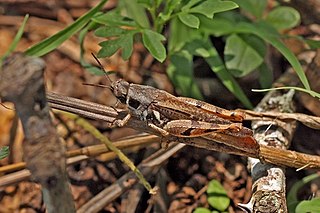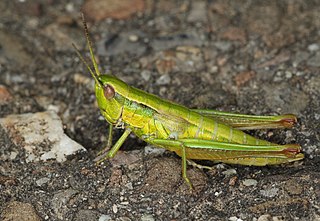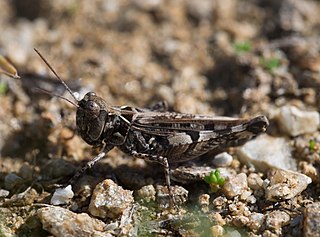
The subfamily Catantopinae is a group of insects classified under family Acrididae. Genera such as Macrotona may sometimes called "spur-throated grasshoppers", but that name is also used for grasshoppers from other subfamilies, including the genus Melanoplus from the Melanoplinae. Indeed, the delimitation of these two subfamilies needs restudy: the Podismini for example are sometimes placed here, sometimes in the Melanoplinae.

The grasshopper subfamily Acridinae, sometimes called silent slant-faced grasshoppers, belong of the large family Acrididae in the Orthoptera: Caelifera.
Peruvia is a genus of South American grasshoppers comprising two species:

Gomphocerinae, sometimes called "slant-faced grasshoppers", are a subfamily of grasshoppers found on every continent but Antarctica and Australia.

Dociostaurus maroccanus, commonly known as the Moroccan locust, is a grasshopper in the insect family Acrididae. It is found in northern Africa, southern and eastern Europe and western Asia. It lives a solitary existence but in some years its numbers increase sharply, and it becomes gregarious and congregates to form swarms which can cause devastation in agricultural areas. The species was first described by Carl Peter Thunberg in 1815.

Proscopiidae is a family of Neotropical grasshoppers, now placed in its own superfamily, the Proscopioidea. Some species may be known as stick grasshoppers or jumping sticks.

Catantops is a genus of grasshoppers in the tribe Catantopini and is typical of the subfamily Catantopinae. Species can be found in Africa, including Madagascar and subcontinental India.

The Lentulidae are a family of flightless grasshoppers found in sub-Saharan Africa.

Dociostaurus is a genus of grasshoppers in the family Acrididae, subfamily Gomphocerinae and typical of the tribe Dociostaurini. Species are found in Africa, southern Europe and Asia, and includes the economically important Moroccan locust.

Romaleinae is a subfamily of lubber grasshoppers in the family Romaleidae, found in North and South America. More than 60 genera and 260 described species are placed in the Romaleinae.
Horesidotes is a genus of slant-faced grasshoppers in the family Acrididae. There are at least two described species in Horesidotes.

The Phlaeobini are a tribe of grasshoppers in the subfamily Acridinae. The recorded distribution of genera includes: Africa, the Middle East and Asia.

Leva is a genus of grasshoppers in the subfamily Gomphocerinae with species found in Africa and Asia.

Dociostaurus genei is a species of slant-faced grasshopper in the family Acrididae. It is found in southern Europe and the Middle East.

Jivarus is a genus of spur-throated grasshoppers in the family Acrididae. There are more than 20 described species in Jivarus, found in Ecuador, Colombia, and Peru.

Ochrilidia is a genus of grasshoppers in the subfamily Gomphocerinae and typical of the tribe Ochrilidiini; it was erected by Carl Stål in 1873. Species have been recorded from Africa, the Middle East through to India and certain Mediterranean islands in Europe.

Brachycrotaphus is a genus of grasshoppers in the subfamily Gomphocerinae, erected by Hermann August Krauss in 1877. Species have been recorded from Africa, southern Europe and India.














